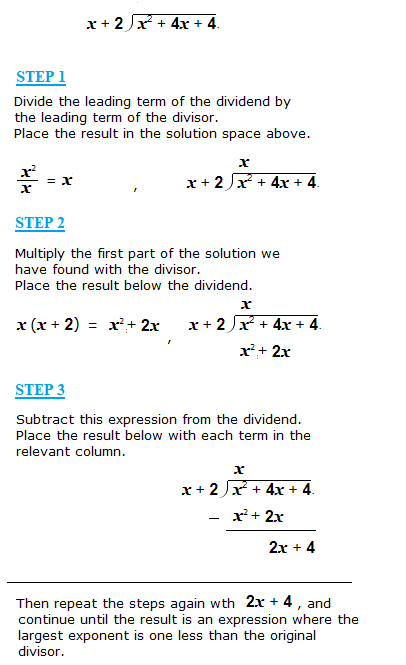Division of algebraic expressions often requires cancelling out terms and exponents, as we look to simplify the terms involved.
Examples
(1.1)
Simplify {\frac{5x^4 \space + \space 11x^2}{2x}}.
Solution
As both terms above share the same denominator, we can split this into 2 fractions.
{\frac{5x^4}{2x}} + {\frac{11x^2}{2x}} From here we can cancel as required in both fractions.
{\frac{5 \times x \times x \times {\cancel{x}} \times {\cancel{x}}}{2 \times {\cancel{x}} \times {\cancel{x}}}} + {\frac{11 \times {\cancel{x}} \times x}{2 \times {\cancel{x}}}}
= {\frac{5x^2}{2}} + {\frac{11x}{2}} Now we can put the 2 fractions together for the full simplified expression.
{\frac{5x^2 \space + \space 11x}{2}}
With enough practice of dividing with algebraic expressions, one is usually able to do the cancelling of terms in a fraction in their head without the need to write the full terms out as we did here.
(1.2)
Simplify {\frac{4x \space {\text{--}} \space 2x^4}{x^3}}.
Solution
{\frac{4x}{x^3}} − {\frac{2x^4}{x^3}}
= {\frac{4}{x^2}} − {\frac{2x^3}{x^2}} = {\frac{4 \space {\text{--}} \space 2x^3}{x^2}}
(1.3)
Simplify 6a^{2}b^{5} \space \div \space 2ab^{6}.
Solution
When presented as a division sum, we can still write the problem out as a fraction.
{\frac{6a^{2}b^{5}}{2ab^{6}}}
In this case, due to the commutative property of multiplication, we can write out as 3 separate fractions multiplied together. Then simplify accordingly.
Before putting the new fractions back together again.
{\frac{6}{2}} . {\frac{a^2}{a}} . {\frac{b^5}{b^6}} = {\frac{3}{1}} . {\frac{a}{1}} . {\frac{1}{b}} = {\frac{3a}{b}}
Division of Algebraic Expressions,
Long Division
Sometimes when dealing with division of algebraic expressions, algebraic long division is an approach that can be used.
Say we had a division sum,
( x^2 + 4x + 4 ) ÷ ( x + 2 ).
To do long division with these algebraic expressions, we set them up as we would with long division for numbers,
x + 2 x^2 + 4x + 4.
Then proceed following several specific steps, shown below.

Examples
(2.1)
( 2x^2 + 6x + 4 ) ÷ ( x + 1 )
Solution
x + 1 2x^2 + 6x + 4
1) [ {\frac{2x^2}{x}} = 2x , 2x(x+1) = 2x^2+2x ]
2x
x + 1 2x^2 + 6x + 4
− 2x^2 + 2x
4x + 4
2) [ {\frac{4x}{x}} = 4 , 4(x+1) = 4x+4 ]
2x + 4
x + 1 2x^2 + 6x + 4
− 2x^2 + 2x
4x + 4
− 4x + 4
0
A single number, even zero, is an expression with an exponent less than the original divisor.
As a single number like 0 can be thought of as the term 0x0.
=> ( 2x^2 + 6x + 4 ) ÷ ( x + 1 ) = 2x + 4
(2.2)
( 4x^2 + 8x − 5 ) ÷ ( 2x + 3 )
Solution
2x + 3 4x^2 + 8x - 5
1) [ {\frac{4x^2}{2x}} = 2x , 2x(2x+3) = 4x^2+6x ]
2x
2x + 3 4x^2 + 8x - 5
− 4x^2 + 6x
2x {\text{--}} 5
2) [ {\frac{2x}{2x}} = 1 , 1(2x+3) = 2x+3 ]
2x + 1
2x + 3 4x^2 + 8x \space - \space 5
− 4x^2 + 6x
2x \space {\text{--}} \space 5
− 2x+3
– 8
This long division of algebraic expressions example has a remainder other than 0.
When this happens, we add or subtract this remainder depending on its nature, as a fraction over the original divisor.
( 4x^2 + 8x \space{\text{--}}\space 5 ) ÷ ( 2x + 3 ) = 2x + 1 \space {\text{--}} \space {\large{{\frac{8}{2x+3}}}}